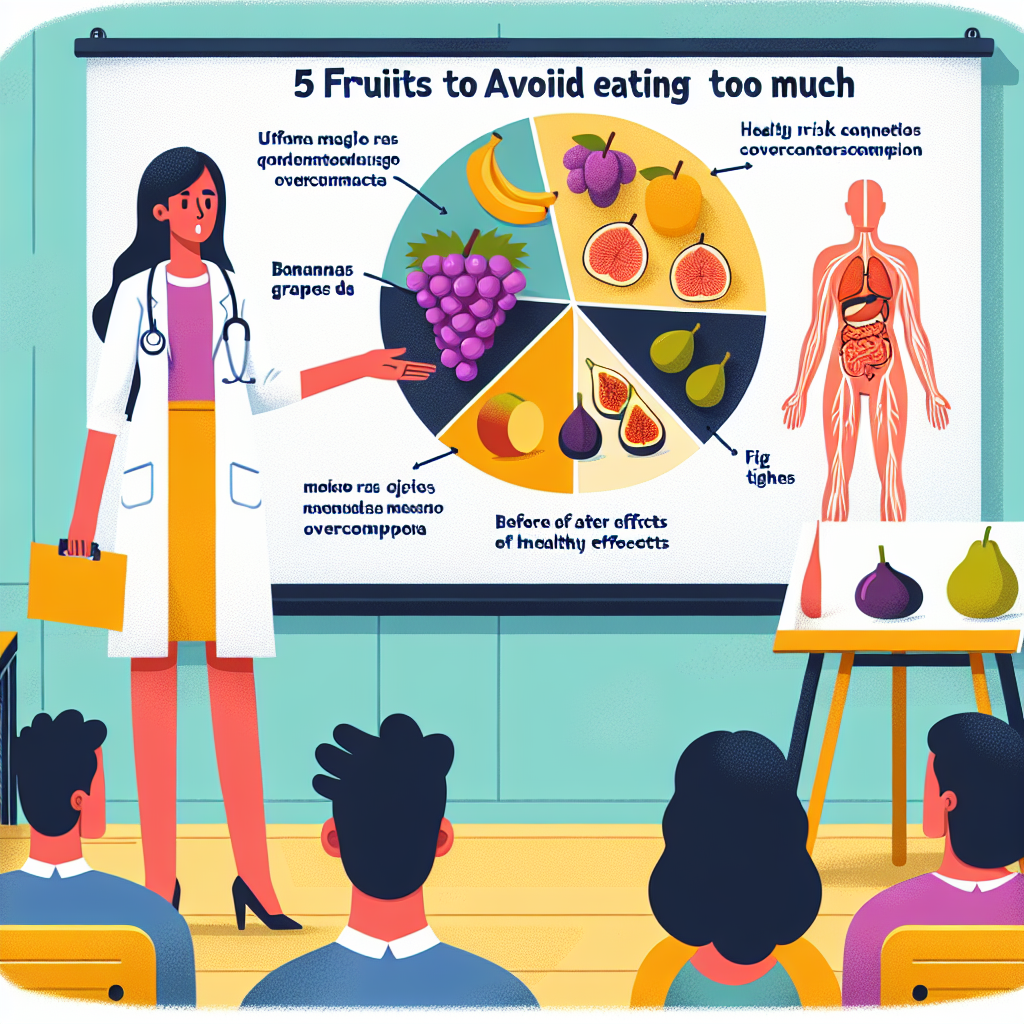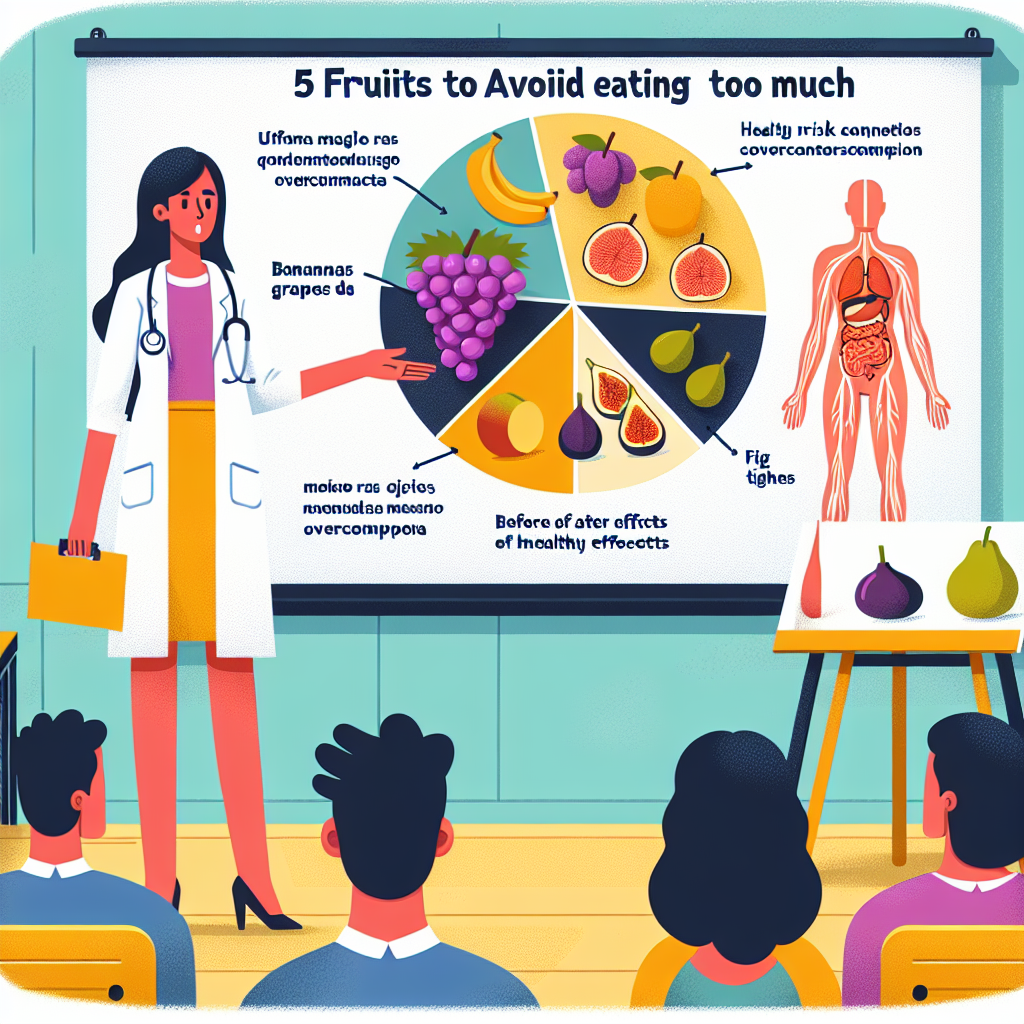Are you a fruit lover? While fruits are an essential part of a healthy diet, it’s crucial to strike a balance and not overindulge in certain types. In this article, we will explore five fruits that you should be cautious about consuming in excessive quantities. By understanding the potential risks associated with these fruits, you can make informed choices to maintain a well-rounded and nutritious diet. So, let’s take a closer look and ensure we keep our fruit consumption in check!

5 Fruits to Avoid Eating Too Much
Pineapple
Pineapple is a delicious tropical fruit that many people enjoy. However, there are a few reasons why you should be cautious about consuming too much of it.
High in Natural Sugar
One of the main reasons to limit your intake of pineapple is its high natural sugar content. While natural sugars are generally healthier than added sugars, consuming excessive amounts can still lead to weight gain and an increased risk of developing health issues such as diabetes or heart disease. It’s important to remember that moderation is key when it comes to pineapple or any other fruit.
Bromelain’s Side Effects
Another factor to consider when consuming large quantities of pineapple is the potential side effects of bromelain, an enzyme found in the fruit. Bromelain has been associated with digestive problems, including diarrhea and stomach discomfort, especially when consumed in excess. If you notice any adverse effects after eating pineapple, it may be worth reducing your consumption and speaking with a healthcare professional if necessary.
Grapes
Grapes are a popular fruit enjoyed in various forms, such as fresh, dried, or as a component of wine. However, like pineapple, there are a couple of reasons why you should monitor your grape intake.
High in Sugar and Calories
Grapes are sweet and tasty, thanks to their natural sugar content. However, this sweetness can be deceptive, as grapes are relatively high in sugar and calories compared to other fruits. Eating too many grapes can contribute to weight gain and potentially affect blood sugar levels, so it’s important to be mindful of portion sizes, especially if you have diabetes or are watching your weight.
Potential Pesticide Residue
Additionally, grapes, particularly conventionally grown ones, have a higher likelihood of containing pesticide residues. Pesticides are used in agriculture to control pests and diseases, but their presence on fruits and vegetables can be a concern. To minimize pesticide exposure, consider choosing organic grapes or thoroughly washing conventionally grown grapes before eating them.
Mango
Mangoes are a juicy, flavorful fruit that can be incredibly tempting. However, there are a couple of considerations to keep in mind when it comes to consuming mangoes.
Excessive Vitamin A Intake
While vitamin A is essential for good health, consuming excessive amounts can be harmful. Mangoes are high in vitamin A, particularly in the form of beta-carotene. Consuming excessive amounts of beta-carotene can cause a condition called carotenemia, which leads to a yellow or orange discoloration of the skin. This condition is not harmful and can be reversed by reducing your intake of beta-carotene-rich foods like mangoes.
High Fructose Content
Another reason to be cautious with mango consumption is its high fructose content. Fructose is a type of sugar found naturally in fruits, but excessive intake can contribute to weight gain, insulin resistance, and increased triglyceride levels. While mangoes provide valuable nutrients, it’s important to enjoy them in moderation and balance them with other fruits and vegetables in your diet.
Bananas
Bananas are a convenient and nutritious fruit that many people rely on as a quick snack. However, despite their many health benefits, there are a couple of factors to be aware of when consuming bananas.
Excessive Potassium Consumption
Bananas are well-known for being a great source of potassium, a mineral that plays a crucial role in maintaining proper heart and muscle function. However, consuming an excessive amount of potassium, especially for individuals with kidney problems, can lead to an electrolyte imbalance. It’s important to be mindful of your overall potassium intake and consult with a healthcare professional if you have any concerns about consuming too many bananas.
High Glycemic Index
Another consideration when it comes to bananas is their high glycemic index (GI). The GI measures how quickly foods can raise blood sugar levels. While bananas contain essential nutrients and dietary fiber, they can cause a rapid spike in blood sugar levels due to their high carbohydrate content. If you have diabetes or are watching your blood sugar levels, it’s advisable to monitor your serving sizes and pair a banana with protein or healthy fats to slow down the absorption of sugars.
Avocado
Avocado has soared in popularity due to its rich and creamy texture, making it a favorite ingredient in salads, toast, and smoothies. However, there are a few aspects to consider when enjoying avocados.
High Fat Content
Avocados are unique among fruits because they are high in healthy fats. While monounsaturated fats found in avocado provide various health benefits, such as improving heart health and reducing inflammation, they are still calorie-dense. Consuming large quantities of avocado can lead to consuming an excessive amount of calories, which may contribute to weight gain if not balanced with other foods in your diet. It’s important to be mindful of portion sizes and incorporate avocados as part of a well-rounded and balanced diet.
Potential Allergic Reactions
Lastly, although rare, some individuals may have an allergic reaction to avocados. Avocado allergies can present themselves as oral allergy syndrome (itching or tingling in the mouth) or more severe symptoms like hives, difficulty breathing, or anaphylaxis. If you experience any adverse effects after consuming avocados, it’s crucial to seek medical advice to determine if you have an allergy or sensitivity to this fruit.
Conclusion
While fruits are generally a healthy part of a balanced diet, it’s important to be mindful of your consumption, even with seemingly beneficial options like pineapple, grapes, mangoes, bananas, and avocados. Moderation is key when it comes to enjoying these fruits, just as it is with any other food group. By being aware of the potential risks associated with overconsumption and balancing your fruit intake with other nutrient-rich foods, you can continue to enjoy these fruits as part of a healthy and varied diet. Remember, it’s all about finding the right balance and making informed choices for your overall well-being.


